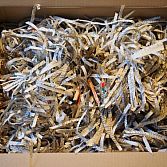Common Office Wastes and How to Dispose of them Effectively
Common Office Wastes and How to Dispose of them Effectively
Companies generate a significant amount of waste. Proper waste management is necessary to reduce hauling costs, enhance sustainability, reduce greenhouse emissions and conserve resources. Identifying the waste you generate and how you can manage them is a responsible way of doing business. It also helps free up more space, resources and even time. With the right system in place and reliable partners such as skip hire companies, you can improve your business's waste management system.
Paper
Even if almost everything seems digital and paperless, small and big companies still generate a significant amount of paper waste. To dispose of them, segregate those that are recyclable. To reduce waste, reuse boxes, use both sides of the paper, or reuse file folders. Go digital whenever possible. For instance, send invoices and memos via email or store manuals and handbooks online instead of printing hard copies.
Equipment
Office equipment is a common waste as businesses need to upgrade. You can click here for skip hire to recycle your trash or bring it to local recycling centres. You may also decide to donate or resell equipment such as office furniture if it's still in good shape. For electronics, you can bring them to recycling centres and designated store drop-off centres. In addition, facilities reuse valuable metals from electronic waste.
Plastics and composite waste
Composite waste is a combination of biodegradable and non-biodegradable materials, which offices commonly generate. Getting a waste management service to help with tons of composite waste is a good idea as these wastes must be sorted out and disposed of properly. To reduce waste, get rid of plastic bottles by encouraging the use of reusable bottles and containers.
Food scraps
In 2018, the UK's manufacturing industry produced around 1.5 million tonnes of food waste or 16% of the country's 9.5 million tonnes of wasted food. Food waste comes from food scraps or spoilage. Companies produce a large amount of food waste; that's why some set up a composting plan to recycle food scraps.
Packing materials
Wooden pallets, tapes, cardboard and bubble wraps are some of the most used packaging materials that end up in landfills. Collect and reuse bubble wraps, bubble mailers and shipping pillows. You can also recycle them by finding a drop-off location.
General waste
Items such as pens, pencils, Styrofoam containers, tissues, napkins and straws are not recyclable. Therefore, the important thing is to segregate them from recyclable materials so that waste collectors will not have a hard time doing so. Then, they are transferred to an engineered landfill site that generates power from the methane of the decomposed waste.
Conclusion
Proper waste disposal and waste reduction are everyone's responsibility. Set up a program that will encourage everyone to participate. Appoint a coordinator who can identify recyclers in your area. Let your employees know the proper waste type, so they know where to put each trash. Use skip hire service, for they can help dispose of your office waste appropriately.
Reactions
Be the first to write a review.
Author
Math

